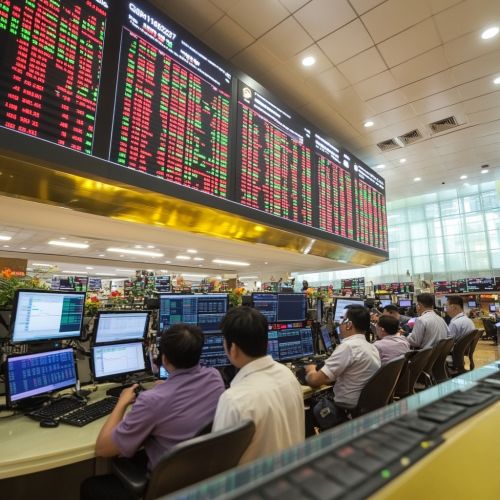State Securities Commission of Vietnam: Difference between revisions
(Created page with "== Overview == The State Securities Commission of Vietnam (SSC) is the primary regulatory body overseeing the securities market in Vietnam. Established under the Ministry of Finance, the SSC plays a crucial role in ensuring the stability, transparency, and efficiency of the Vietnamese securities market. The commission is responsible for the regulation and supervision of securities activities, the securities market, and securities-related services. == History == The SSC...") |
No edit summary |
||
| Line 71: | Line 71: | ||
* [[Corporate Governance]] | * [[Corporate Governance]] | ||
[[Image:Detail-97665.jpg|thumb|center|Vietnamese stock market trading floor with traders and electronic screens displaying stock information.|class=only_on_mobile]] | |||
[[Image:Detail-97666.jpg|thumb|center|Vietnamese stock market trading floor with traders and electronic screens displaying stock information.|class=only_on_desktop]] | |||
[[Category:Finance in Vietnam]] | [[Category:Finance in Vietnam]] | ||
[[Category:Government agencies of Vietnam]] | [[Category:Government agencies of Vietnam]] | ||
[[Category:Securities and Exchange Commission]] | [[Category:Securities and Exchange Commission]] | ||
Latest revision as of 03:08, 19 August 2024
Overview
The State Securities Commission of Vietnam (SSC) is the primary regulatory body overseeing the securities market in Vietnam. Established under the Ministry of Finance, the SSC plays a crucial role in ensuring the stability, transparency, and efficiency of the Vietnamese securities market. The commission is responsible for the regulation and supervision of securities activities, the securities market, and securities-related services.
History
The SSC was established on November 28, 1996, by the Prime Minister's Decision No. 75/1996/QD-TTg. Its creation marked a significant milestone in the development of Vietnam's financial market, reflecting the government's commitment to fostering a robust and transparent securities market. Over the years, the SSC has undergone various reforms and restructuring to adapt to the evolving market conditions and international standards.
Organizational Structure
The SSC operates under the Ministry of Finance and is headed by a Chairman, supported by Vice-Chairmen and various departments. The main departments include:
- Department of Securities Issuance
- Department of Market Supervision
- Department of Legal Affairs
- Department of International Cooperation
- Department of Information Technology
- Department of Personnel and Training
Each department has specific functions and responsibilities, contributing to the overall mission of the SSC.
Functions and Responsibilities
The SSC's primary functions and responsibilities include:
- **Regulation and Supervision:** The SSC formulates and enforces regulations governing the securities market, ensuring compliance with legal and regulatory frameworks.
- **Market Development:** The SSC promotes the development of the securities market through various initiatives, including the introduction of new financial instruments and market mechanisms.
- **Investor Protection:** The SSC implements measures to protect investors, including the enforcement of disclosure requirements and the prevention of market manipulation and insider trading.
- **International Cooperation:** The SSC engages in international cooperation with other securities regulators and international organizations to enhance the regulatory framework and adopt best practices.
- **Education and Training:** The SSC provides education and training programs for market participants to enhance their understanding of the securities market and regulatory requirements.
Regulatory Framework
The SSC operates within a comprehensive regulatory framework that includes various laws, decrees, and circulars. Key legislative documents include:
- **Securities Law:** The primary legislation governing the securities market, outlining the principles and regulations for securities issuance, trading, and market activities.
- **Decrees and Circulars:** Detailed regulations and guidelines issued by the government and the SSC to implement the provisions of the Securities Law.
Market Supervision
The SSC is responsible for the supervision of the securities market, ensuring compliance with regulatory requirements and maintaining market integrity. Key aspects of market supervision include:
- **Licensing and Registration:** The SSC oversees the licensing and registration of securities firms, fund management companies, and other market participants.
- **Monitoring and Enforcement:** The SSC monitors market activities, conducts inspections, and enforces compliance with regulations. This includes investigating and taking action against violations such as market manipulation and insider trading.
- **Disclosure and Transparency:** The SSC enforces disclosure requirements to ensure that market participants provide accurate and timely information to investors.
Market Development Initiatives
The SSC has implemented various initiatives to promote the development of the securities market, including:
- **Introduction of New Financial Instruments:** The SSC has introduced new financial instruments such as derivatives and corporate bonds to diversify investment options and enhance market liquidity.
- **Market Infrastructure Development:** The SSC has worked on improving market infrastructure, including the establishment of the Vietnam Securities Depository (VSD) and the development of electronic trading systems.
- **Corporate Governance:** The SSC has promoted good corporate governance practices among listed companies to enhance transparency and investor confidence.
International Cooperation
The SSC actively engages in international cooperation to enhance its regulatory framework and adopt best practices. Key aspects of international cooperation include:
- **Bilateral and Multilateral Agreements:** The SSC has entered into various bilateral and multilateral agreements with other securities regulators and international organizations.
- **Participation in International Organizations:** The SSC is a member of international organizations such as the International Organization of Securities Commissions (IOSCO), contributing to global regulatory standards and practices.
- **Technical Assistance and Capacity Building:** The SSC receives technical assistance and participates in capacity-building programs to enhance its regulatory capabilities.
Challenges and Future Directions
The SSC faces several challenges in its mission to regulate and develop the securities market, including:
- **Market Volatility:** Managing market volatility and ensuring stability in the face of global economic uncertainties.
- **Regulatory Compliance:** Ensuring compliance with evolving regulatory requirements and international standards.
- **Investor Protection:** Enhancing investor protection mechanisms to build investor confidence and trust in the market.
Future directions for the SSC include:
- **Strengthening Regulatory Framework:** Continuously updating and strengthening the regulatory framework to address emerging market trends and risks.
- **Promoting Market Liquidity:** Implementing measures to enhance market liquidity and attract more domestic and foreign investors.
- **Enhancing Market Infrastructure:** Investing in advanced market infrastructure and technology to support market growth and efficiency.
See Also
- Vietnam Securities Depository
- International Organization of Securities Commissions
- Corporate Governance


